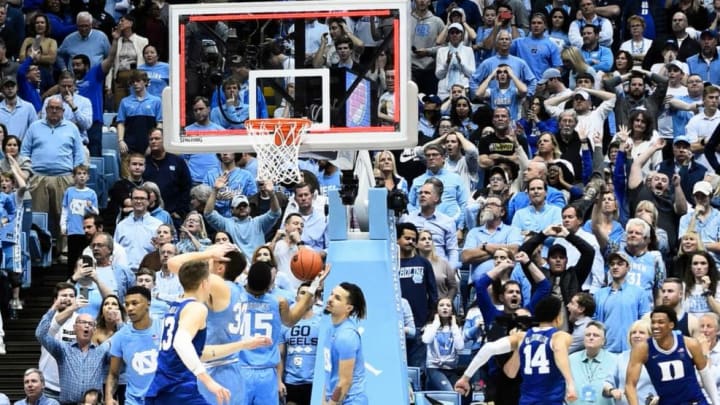Killing the Bad Guy Twice: Duke Steals Win From UNC

You always have to kill the bad guy twice.
It’s a law of nature that anyone who has seen a horror movie can confirm. The hero of the movie renders what, by all accounts, appears to be a death blow to the werewolf, vampire or serial killer. Then, just as it appears credits are ready to roll, the villain rises again in a jump scare, before he or she is killed for real.
North Carolina forgot this basic rule, and the bad guy rose up from the grave and throttled the Tar Heels into submission—not once, but twice, once in regulation and again in overtime.
For 39-plus minutes, UNC appeared to be on the verge of saving its season. It was the Cinderella story upon which rivalries like Carolina-Duke are built. Not that there are any rivalries like Carolina-Duke, as the two legendary programs proved yet again on Saturday night.
Entering the game at 10-12, with a losing record for the first time since 2002, and the most losses upon playing Duke for the first time in the history of the rivalry, Carolina controlled the game from start to nearly finish. The Tar Heels dominated the boards. They got contributions from role players who have struggled all year long, like Christian Keeling (13 points) and Justin Pierce (11). They neutralized Duke big man Vernon Carey Jr., fouling him out with 4:16 remaining and Carolina up 13.
Duke, it appeared, was dead. The Tar Heels had their biggest lead of the night, and Duke had lost its best player. The No. 7 Blue Devils had not produced an extended run all night.
Three minutes later, Duke had produced an 11-4 run and cut the lead to 80-75. The pulse was still there, but barely detectable. There was just over a minute left. The Tar Heels merely needed to hit free throws and play out the string, then figure out how to celebrate.
Then UNC’s Andrew Platek missed a pair of free throws, and Tre Jones put the lifeless body of his team on his back and began climbing out of the tomb.
Jones drove the lane and scored. Then he hit a pair of free throws, and another layup. With six seconds left, he took the ball in the backcourt, with his team down three.
UNC took away his chance to be the hero, fouling him before he got into position to shoot a game-tying three. Jones went to the line and hit the first free throw with four seconds remaining. Then he missed the second, and the bad guy grabbed the hero away from the damsel in distress, pulling him into the blackness.
The ball ricocheted off the rim and somehow ended up back in Jones’ hands. He scooped it off the floor and put up a desperation shot with a form that bordered on underhand. It fell smoothly through the rim as time expired, landing Jones in the annals of rivalry history. He had scored all nine of Duke’s points in the desperate 48-second run to tie the game at 84 and send it to overtime.
He continued his run in the extra period, scoring the team’s first six points and giving Duke its first lead since 4-3. The Tar Heels responded, however, and pulled in front by five with 20 seconds remaining. Cassius Stanley had fouled out by that point and the bad guy again lay lifeless in the background.
Again Jones refused to let the Devils die. He scored on a layup to cut the lead to three, then missed a free throw that Wendell Moore put back in to cut it to one.
UNC turned the ball over on the inbounds and Jones drove yet again, drawing a foul and going to the line with six seconds left and Duke down one. He hit the first to tie it, then missed the second. The ball bounced around and ended up yet again in Moore’s hands. He laid the ball over the rim just as time expired, and Duke piled up on the Smith Center floor, after winning 98-96.
Duke scored seven points in the final 16 seconds. Jones scored 18 in the final 5:48. The Blue Devils won in Chapel Hill for the first time in four years. They recorded their 20th win on the year and 10th ACC victory, and left the Tar Heel players wiping away tears as they met with the media.
Sometimes, killing the bad guy twice just isn’t enough.
